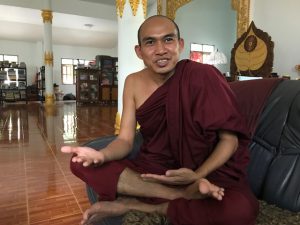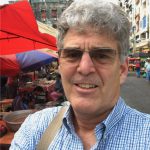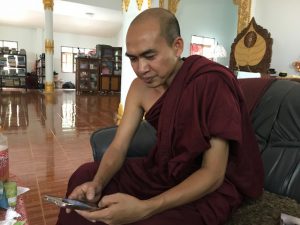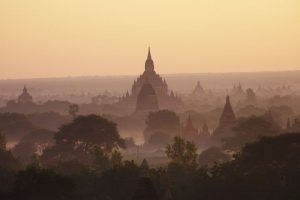Sunday
Featured StoriesA Monk Called King Zero
Part One of an interview with Buddhist monk Ashin Issariya, from Wimoteti Thuka Monastery, Myanmar
by Larry Steele
 The Buddhist monk Ashin Issariya is working to create an enlightened society in the confused and violent land of Myanmar.
The Buddhist monk Ashin Issariya is working to create an enlightened society in the confused and violent land of Myanmar.
Myanmar, the country formerly known as Burma, has been in the news since last year because its military has burned villages, killed innocents, and driven more than 700,000 ethnic Rohingya Muslims into the world’s largest refugee camp in Bangladesh.
Ashin Issariya has a Dharma teaching for Myanmar’s too-powerful generals: “Always check what your mind is thinking,” Issariya says. “If your thinking is the wrong way, please stop it.”
Issariya recently joined many of Shambhala’s senior teachers and other Buddhist leaders in signing the Buddhist Humanitarian Appeal, an open letter to the Myanmar government’s Buddhist advisory council. The appeal supports a peaceful and compassionate solution to the Rohingya refugee crisis.
(Please read Richard Reoch’s Eyewitness Report about the Rohingya crisis and consider signing the letter. Richard, who serves as a Special Emissary of Sakyong Mipham Rinpoche, visited the refugee camp in April.)
Because 90% of Myanmar’s people are Buddhist, the brutal actions of the military have given rise to troubling international media coverage about “Buddhist terrorism” and “Buddhist Islamophobia.”
Ashin Issariya disputes this narrative.
“This is not Buddhism,” he said. “Buddhists have to obey the precepts. It means no killing. We say loving kindness. Rule according to law.”
Sadly, few Myanmar people are willing to speak up in defense of the Rohingya. On a recent trip to the country I asked about the violence in Rakhine State. From a dharma teacher at a meditation center, a university librarian, a boat driver on the Irawaddy River, and many others, people’s responses were remarkably similar: “I don’t know anything about that,” they said. “That’s a long way away.” “We try to ignore it.”
Author Emma Larkin spent a year traveling across Myanmar to research her book “Finding George Orwell in Burma.” She suggests that Orwell’s “1984” was based on Burma, where the distopian writer served in the British imperial administration. Orwell also wrote “Burmese Days,” about racist colonial attitudes. In both books ignorance of reality and forced acceptance of false government narratives that become “newspeak” — the new truth — are central features.
In Myanmar today hate speech has become newspeak.
“Hate speech is the problem,” Issariya said. “There is a long history of hate speech. There are many Muslim countries around us; Indonesia, Malaysia, Bangladesh. When the army uses hate speech, in their minds, people began to think that Muslims kill.”
Extremists rallied by a young monk named Ashin Wirathu have captured headlines and Facebook followers by inciting fear of the Rohingya Muslims.“One month ago I held a press conference about Wirathu,” Issariya said. “The military allows him to do this, and supports him.” American aid workers and human rights observers agree.
Wirathu and the Buddhist nationalist organization Ma Ba Tha have organized an influential conservative movement. They use social media, primarily Facebook, to spark demonstrations and fan the flames of Islamophobia.
“Somebody is providing them with a lot of resources,” said an experienced U.S. human rights worker. “They have lots of Ipads, computers, and cell phones. They record their interviews and make corrections if they think they’ve been misquoted. The army pays respect to them.”
Another American who works at the US Embassy referred to “the nefarious, shadowy hand of the Tatmadaw,” the local name for Myanmar’s military. “The military turns the key” to start the violence between us, Issariya said. He repeatedly uses a hand gesture like turning an ignition key.
Ethnic cleansing of the Rohingya Muslims is not the only militarized violence against Myanmar’s 135 registered ethnic communities. For decades they have been marginalized and denied education and freedom of movement.
The partially-democratic governmant led by Nobel Peace Laureate Aung San Suu Kyi has negotiated a National Ceasefire Agreement with 10 ethnic rebel groups, but others, most recently the Kachin Independence Army in the country’s north, say that human rights violations by the army continue. The Tatmadaw perpetuates conflict in border areas and ethnic communities to justify its hold on power.
“The army takes money out of people‘s pockets,” Issariya said. “The people don’t agree. So they fight.”
“We should all be friends. But if we are fighting each other we cannot unite against the army,” Issariya said.
 Larry Steele meditates at the Seattle Shambhala Center. He has worked and travelled as an international businessperson, and last year retired from his work as a high school educator in business and world history.
Larry Steele meditates at the Seattle Shambhala Center. He has worked and travelled as an international businessperson, and last year retired from his work as a high school educator in business and world history.








May 18, 2018
Reply
I am glad there is one buddhist monk willing to stand up and say genocide is not right! Good grief! The country must otherwise be “buddhist” in name only!